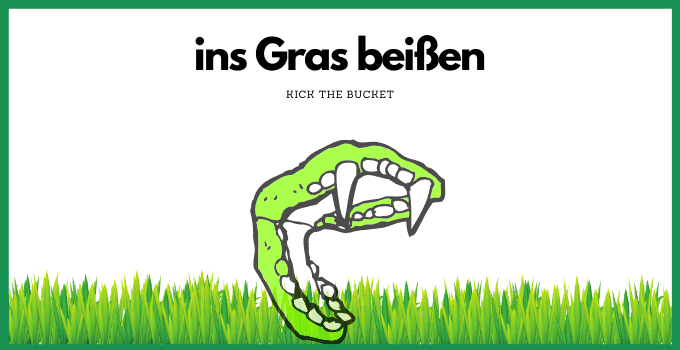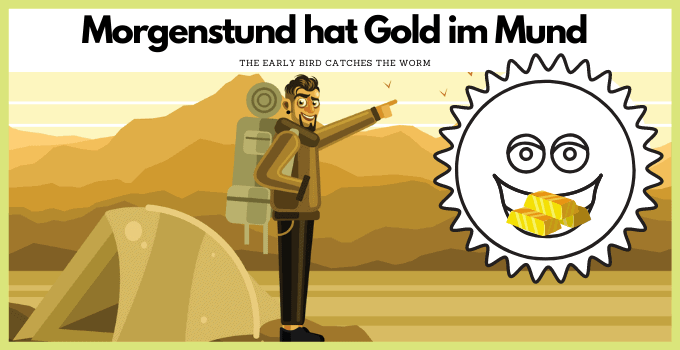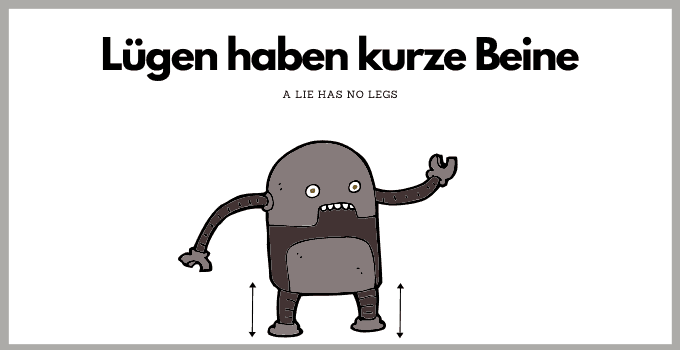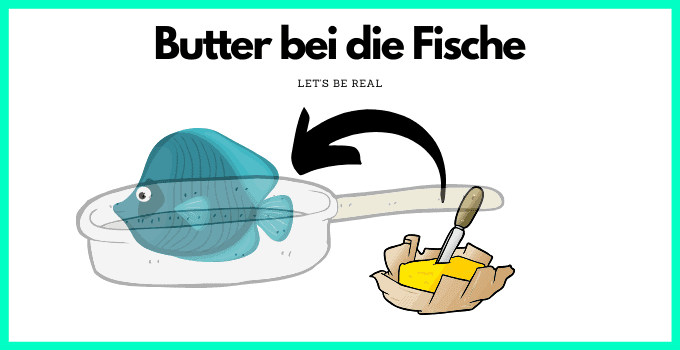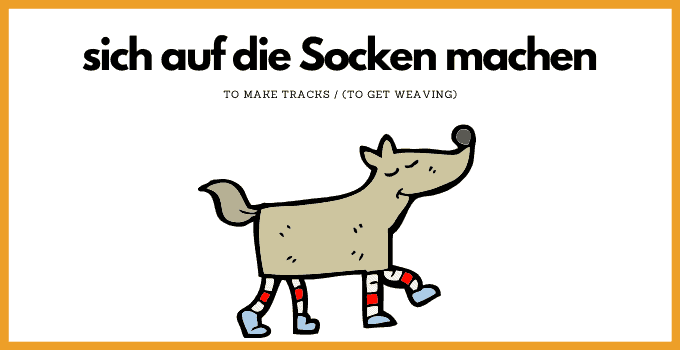Welcome, Linguaholics! Today we will take a deep dive into German sayings…and there is definitely a lot to be explored here! If your native language is English, some of these sayings might sound familiar while others most certainly won’t ring a bell.
So, without further ado, let’s get right to the point! We will start with German saying Nr. 1….and will end this rollercoaster ride when we arrived at German saying Nr. 34! Fasten your seatbelt and let’s goooo!
The Best German Sayings
- brüllen wie am Spieß
- dumm wie Bohnenstroh
- Die Flinte ins Korn werfen
- in den sauren Apfel beißen
- um den heißen Brei reden
- die Nase (gestrichen) voll haben
- aus dem Nähkästchen plaudern
- ins Gras beißen
- Schnne von gestern
- Morgenstund hat Gold im Mund
- Lügen haben kurze Beine
- Butter bei die Fische
- mit der Tür ins Haus fallen
- wer A sagt, muss auch B sagen
- etwas im Schilde führen
- auf großem Fuß leben
- die Katze im Sack kaufen
- den Braten riechen
- kein Blatt vor den Mund nehmen
- in den Sand setzen
- jemandem Löcher in den Bauch fragen
- Krokodilstränen weine
- übers Ohr hauen
- auf Wolke 7 schweben
- sich einen hinter die Binde kippen
- Mein Name ist Hase, ich weiß von nichts
- Mit jemandem ist nicht gut Kirschen essen
- man muss die Kirche im Dorf lassen
- sich auf die Socken machen
- auf dem Holzweg sein
- Schlafen wie ein Murmeltier
- wie Pilze aus dem Boden schießen
- da scheiden sich die Geister
- auf dem falschen Dampfer sein

1. brüllen (schreien) wie am Spieß
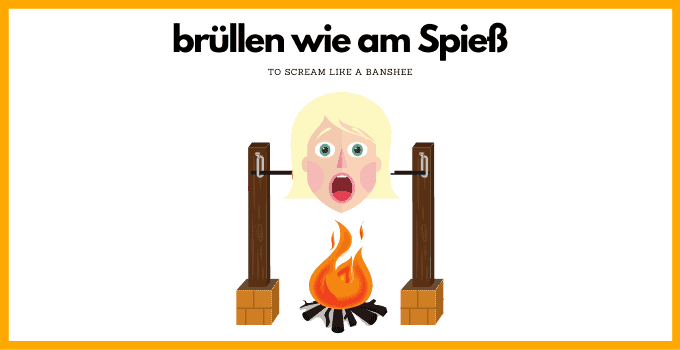 If what you are doing is “Brüllen wie am Spieß” you are most likely in pain, be it physical or mental. The German saying “Brüllen wie am Spieß” literally translates to ‘roar like on a roasting spit (pike)’.
If what you are doing is “Brüllen wie am Spieß” you are most likely in pain, be it physical or mental. The German saying “Brüllen wie am Spieß” literally translates to ‘roar like on a roasting spit (pike)’.
[adinserter name=”Block 17″]
Now, in German, we got the noun “Spieß”. This “Spieß” could either be a roasting spit but it could also be a “Spieß” that was used in war times, something along the lines of a ‘war pike’.
In fact, the etymology of this German saying is pretty unclear. But we know for a fact that it has been around for quite a long time, since the 16th century, to be more exact. So, that also sort of increases the probability that this German saying is actually related to war (pikes used in war).
In German, there is also the verb “aufspießen,” in English ‘to impale’ which refers to the brutal act of spearing someone with a spear.
So how do you put “Brüllen wie am Spieß” to good use in German? You can use “Brüllen wie am Spieß” in a metaphorical way when someone is either in deep physical pain but also if someone, usually a child, is crying very heavily because of something (not necessarily related to physical pain).
Example:
Als ich ihm die Schokolade weggenommen habe, fing er an zu Brüllen wie am Spieß
Translation:
When I took away his chocolate, he started screaming like a banshee
2. dumm wie Bohnenstroh
 “Dumm wie Bohnenstroh” literally translates to “dumb as bean straw.” So if somebody calls you just that, you should probably not be all too happy about it.
“Dumm wie Bohnenstroh” literally translates to “dumb as bean straw.” So if somebody calls you just that, you should probably not be all too happy about it.
But why is bean straw dumb?
I guess this is the main question we need to figure out, right? The German saying “as dumb as bean straw” originates from the time when people equipped their beds with straw sacks or mattresses filled with straw.
Very poor people could not afford crop straw and therefore resorted to the cheaper bean straw.
Okay, great. But why does this make these people dumb?
It is believed that poor people were sometimes automatically considered to be dumb(er) because they had lesser education and therefore, also a lack of intelligence.
Example:
A: Ich glaube die Prüfung von morgen wird ziemlich einfach. Ich mache mir darüber absolut keine Gedanken.
B: Ja, ich glaube auch. Das sollte für uns kein Problem sein. Aber für Stefan wirds wohl schwierig. Der Typ ist echt dumm wie Bohnenstroh!
Translation: A: I think tomorrow’s exam will be pretty easy. I don’t worry about it at all. B: Yes, I think so too. That shouldn’t be a problem for us. But for Stefan, it will probably be difficult. The guy is really dumb as a post!
3. Die Flinte ins Korn werfen
If you give up, you are ‘throwing in the towel.’ Especially in boxing events, fighters are said to throw in the white towel if they can’t fight anymore and have to give up.
Well, this ‘job’ is usually done by the fighter’s team and not the boxer itself. So very recently, Deontay Wilder’s team had to throw in the towel when Deontay was fighting Tyson Fury.
In this fight, Deontay Wilder was outclassed from start to finish (well, for as long as it lasted) and to prevent even more damage, his team decided they had seen enough and threw in the towel to stop the fight.
So, in German, we do have a very similar saying that goes like “Das Handtuch werfen.” But wait a minute, doesn’t German saying Nr. 8 say “Die Flinte ins Korn werfen?” You are right. Of course, it does.
This “Die Flinte ins Korn werfen” is actually yet another nice German saying to say the same. The German expression “die Flinte ins Korn werfen” originates from wartime and refers to soldiers who preferred to surrender rather than fight in a hopeless battle and literally threw away their weapons (into the cornfield, if there was one obviously).
Example:
A:Ich schaff das nie. Die anderen sind alle viel besser als ich. Ich werde an diesem Turnier gar nicht erst teilnehmen!
B: Jetzt hör aber auf. Du kannst doch die Flinte nicht einfach so ins Korn werfen! Du schaffst das schon!
Translation:
A: I’ll never make it. The others are all much better than me. I’m not even gonna be in this tournament! You can’t throw in the towel like that. You can do it.
4. in den sauren Apfel beißen
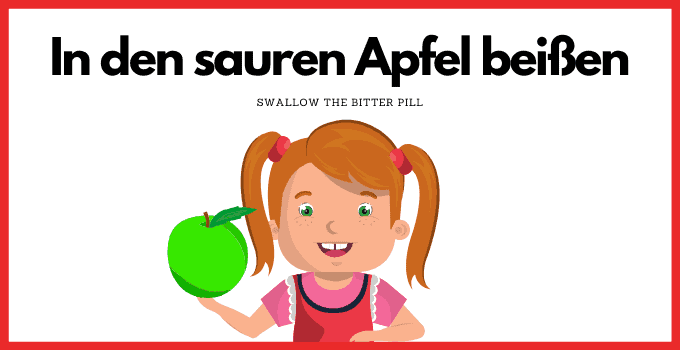 The English saying that comes closest to in den sauren Apfel beißen would be to swallow the bitter pill. So the meaning that you would like to get across here is that you are actually doing something that you don’t won’t do at all but HAVE to do.
The English saying that comes closest to in den sauren Apfel beißen would be to swallow the bitter pill. So the meaning that you would like to get across here is that you are actually doing something that you don’t won’t do at all but HAVE to do.
[adinserter name=”Block 17″]
Example:
Ich will heute die Hausaufgaben nicht machen. Das Weter ist so schön draußen! Ich will mit meinen Freunden Fussball spielen gehen! Kommt gar nicht in Frage, Peter! Da musst du halt jetzt in den sauren Apfel beißen!
Translation: I don’t want to do my homework today. The weather is so nice outside! I want to go play soccer with my friends! No way, Peter! You’ll just have to bite the bullet now!
5. um den heißen Brei reden
 If you beat about the bush, what you are doing is nothing else than “um den heißen Brei reden,” which literally translates to ‘talking around the hot mash.’
If you beat about the bush, what you are doing is nothing else than “um den heißen Brei reden,” which literally translates to ‘talking around the hot mash.’
So whenever you are not really talking about what really matters with regards to a certain subject, what you are doing is just simply “um den heißen Brei reden.”
So maybe you won the lottery and are just telling everybody that you have a few bucks more at your disposal than it used to be or maybe you have been banned from school but are just telling everybody that for a certain reason you were not able to attend school these last few days…
Our advice: Just be honest and don’t beat about the bush (for too long)!
Example:
Jetzt hör endlich damit auf, um den heißen Brei zu reden! Wer ist denn nun der Freund von Michaela?!?
Translation:
Stop beating around the bush. Who is Michaela’s boyfriend?
6. die Nase (gestrichen) voll haben
 Die Nase (gestrichen) voll haben (lit. to have a full nose) simply means that somebody is fed up with something or someone. This German saying is pretty popular and you will hear it often pretty often in everyday speech.
Die Nase (gestrichen) voll haben (lit. to have a full nose) simply means that somebody is fed up with something or someone. This German saying is pretty popular and you will hear it often pretty often in everyday speech.
The saying is pretty informal obviously. To make the phrase “Die Nase voll haben” even more powerful, you can add a “gestrichen” in front of voll, and at that point everybody should be aware that you are extremely fed up with that something (or someone).
Example:
Ich habe die Nase von der Schule gestrichen voll! Ich werde dort morgen nicht mehr hingehen!
Translation:
I’m really sick and tired of school! I’m not going back there tomorrow!
7. aus dem Nähkästchen plaudern
 ‘To talk out of the sewing box.’ That would be the literal translation of “aus dem Nähkästchen” plaudern. But what the heck is that even supposed to mean? Well, it means “to give away secrets,” more specifically telling inside stories.
‘To talk out of the sewing box.’ That would be the literal translation of “aus dem Nähkästchen” plaudern. But what the heck is that even supposed to mean? Well, it means “to give away secrets,” more specifically telling inside stories.
That could be at work or also in the office. But where does the sewing box fit into all of this?!? Well, sewing boxes used to be a good place to hide secrets. So in earlier times, women often hid secrets in the sewing box along with their sewing tools.
The sewing box seemed to be the perfect place for secrets, as only women had access to it. It all makes sense now, right? If not, the following example hopefully clears things up for you!
Example:
Bei deiner Großmutter ist auch wirklich kein Geheimnis sicher! Die plaudert doch den ganzen Tag aus dem Nähkästchen!
Translation:
No secret is safe with your grandmother! She talks all day long.
8. ins Gras beißen
This one’s a little bit mean, to say the least. And you wouldn’t use “ins Gras beißen” in an everyday conversation unless you would like to use it as a joke, as this German saying is, after all, very informal. This saying dates back to the 17th century and means ‘to die.’ The English equivalent to “ins Gras beißen” would be ‘to bite the dust.’
This saying is closely related to soldiers who died in the war, as it was said in this context that they ‘bit the dust’ when they fell to the ground, wounded or maybe even dead. The English equivalent of “to bite the dust” can be found in many literal works.
Also, a variation of the phrase can be found in the Bible (King James Version) as early as 1611: ‘They that dwell in the wilderness shall bow before him, and his enemies shall lick the dust.’
It seems that the German saying “ins Gras beißen” is, after all, just a little friendlier, as soldiers could at least enjoy some grass instead of just dust.
Example:
Und auch wenn du dabei ins Gras beißt, du beendest nun deine Arbeit!
Translation:
And even if you bite the dust, you finish the job!
9 Schnee von gestern
 Schnee von gestern, literally “yesterday’s snow” is one of these German sayings that is pretty easy to grasp.
Schnee von gestern, literally “yesterday’s snow” is one of these German sayings that is pretty easy to grasp.
You’ve heard that saying twice, and you can most likely already use it flawlessly in a German sentence (if not, don’t worry, there’s going to be an example). But where does this saying even come from?
There’s actually a pretty interesting story behind “Schnee von gestern.” Who would have thought that? Well, I didn’t. The saying is attributed to François Villon, a fifteenth-century French poet.
Example:
A: Bist du noch mit Uta zusammen?
B: Nein, unsere Beziehung ist Schnee von gestern.
Translation:
A: Are you still together with Uta?
B: No, our relationship is water under the bridge.
[adinserter name=”Block 17″]
10. Morgenstund hat Gold im Mund
While in English, we are (well, at least metaphorically) dealing with worms when talking about the benefits of getting up early, in German, we have something a little bit more pleasant to deal with, namely…….GOLD.
‘The early morning hours have gold in its mouth’ that sounds silly..right? But that’s what “Morgenstund hat Gold im Mund” when translated literally.
Example:
Morgen beginnt der Unterricht bereits um 6 Uhr früh! Morgenstund halt Gold im Mund!
Translation:
Tomorrow the lessons start already at 6 am! The early bird catches the worm!
11. Lügen haben kurze Beine
In English, lies do apparently not have any legs. This becomes apparent when having a glance at the English phrase “A lie has no legs.”
In German, however, lies do seem to have some legs. Just short ones, though, as the German saying goes, “Lügen haben kurze Beine.” The meaning of this German phrase is simply that lies won’t get you far, and they will most probably not last long. Let us have a look at an example to clear things up for everybody.
Example:
A: Ich erzähle meinem Lehrer einfach, dass ich die ganze Woche krank war. Wird schon gutgehen!
B: Ach Peter! Das ist eine schlechte Idee. Du weißt doch, Lügen haben kurze Beine!
Translation:
A: I just tell my teacher that I was sick all week.
B: Oh, Peter! This is a bad idea. You know, lies don’t travel far.
12. Butter bei die Fische
This German saying sounds a little off. In fact, it sounds ungrammatical to a speaker of modern high German. Butter BEI DIE FISCHE?
Why is it DIE and not something like BEI DEN Fischen? or maybe Butter ZUM Fisch? Well, to be honest, I don’t know. But I will investigate that, and if something comes up, I will make sure to share it with all of you guys here.
Now, let’s get to the meaning of Butter bei die Fische, though. This German saying simply means that one should get to the point. So, one should not (anymore) beat around the bush.
Oh, and by the way, earlier in this article, we have seen that we do have a neat German saying for “to beat around the bush,” which is “um den heißen Brei reden,” remember?
But how the hell would you go about using “Butter bei die Fische” in an actual German sentence, then? Don’t worry. I will clear things up for you. NOW.
Example:
A: Kannst du mir 30 Euro leihen?
B: Wozu brauchst du das denn?
A: Ich muss mir nen neuen Pullover kaufen! Geht das also in Ordnung?
B: Ich hab eben selbst nicht so viel Geld, hmm……lass mich mal überlegen….
A: Aber jetzt mal Butter bei die Fische! 30 Euro ist doch nicht viel, das kannst du mir doch ohne Probleme geben!
B: Ja, du hast eigentlich recht. Ok, hier hast du sie.
Translation:
A: Can you lend me 30 euros? B: What do you need it for? A: I have to buy a new sweater! So is that okay?
B: I don’t have that much money myself, you know…let me think about it for a while…uhmm….
A: Come on, man. Let’s be real! 30 Euro is not that much, I am sure you can afford it!
B: Yes, you are actually right. Ok, here you go!
13. Mit der Tür ins Haus fallen
It is unclear where this saying actually comes from. But it certainly makes for a great saying that is easy to understand. The door (Türe) in the German saying “Mit der Tür ins Haus fallen” represents the separator of the public sphere and the private sphere.
You could also say that it separates what happens outside (the public world) and inside (behind doors, at home, etc.).
That said, “Mit der Tür ins Haus fallen” signifies that somebody is not respecting that barrier between the outside and the inside world and is, therefore, going like a bull at a gate (is, for instance, asking something too private or intimate, before actually establishing a formal relationship, all by respecting the general rules of conversation.)
Example:
Sorry, dass ich gerade so mit der Tür ins Haus falle, aber möchtest du mit mir ins Kino gehen?
Translation:
Sorry to drop in on you like this, but would you like to go to a movie with me?
14. wer A sagt, muss auch B sagen
This German expression is very easy to understand. The literal translation would be something along the lines of “Who says A, also needs to say B”. The exact origin of this German saying is up for debate.
There are a couple of possible explanations for this. The easiest one being is that this German saying is simply based on the alphabet because there ―who would have thought it― B follows A.
[adinserter name=”Block 17″]
There are other possible origins, though. One possible explanation is related to the German legal system. It’s a little bit complicated, though. It has something to do with two different verbs that are used in that context, “anklagen” and “besagen.”
As you can see, “anklagen” starts with the letter A, and “besagen” starts with the letter B.
Example:
Du hast mir diese Playstation bezahlt, dann musst du jetzt auch mit mir spielen. Wer A sagt, der muss auch B sagen!
Translation:
You bought this Playstation for me, so now you have to play with me too. Whoever says A must also say B!
15. etwas im Schilde führen
A shield is a defensive weapon. I think that is something we can all agree on. But a shield used to be much more than that. In middle age, shields usually featured crests (emblems) that let everybody know about the origin of the shield bearer and also allowed conclusions to be drawn about his identity and intention.
So, “im Schilde führen” means that the owner of the shield actually carried something along with his shield ― the crest (emblem) that figured on the shield. And this symbol always carried a certain (metaphorical) message.
Now, the modern “im Schilde führen,” as embodied in the German language, is an allusion to this fact and simply means that somebody has ‘something up one’s sleeve.’
So, somebody has a certain intention that people are yet unaware of (because he wouldn’t tell it). Does that make any sense? I hope it does. If it doesn’t, an example usually helps.
Example:
Bernd: Du bist sonst nie so ruhig. Da stimmt doch etwas nicht. Du führst bestimm etwas im Schilde!
Beatrice: Ach was, es ist alles in Ordnung!
Bernd: Nene, ich kenne Dich!
Beatrice: Ok, du hast recht. Ich wollte dich heute Abend eigentlich überraschen, aber nun hast du gesagt, dass du heute abend gar nicht da bist!
Bernd: Ja, leider.
Aber überrasch mich doch morgen!
Beatrice: Ok, geht klar!
Translation:
Bernd: You are never this calm. There must be something wrong with you. You are certainly up to something!
Beatrice: Oh no, everything is fine!
Bernd: Naaah, I know you!
Beatrice: Okay, okay. You’re right. I wanted to surprise you tonight, but now you’ve said that you’re not even here tonight!
Bernd: Yes, unfortunately. But what about a little surprise tomorrow, maybe?
Beatrice: Haha, we will see!
16. auf großem Fuß leben
Somebody who is living like a lord is “living on big feet,”… at least if the German saying “auf großem Fuß leben” is to be believed.
Also, in German, there’s actually another saying that means more or less the same: “In Saus und Braus leben.”
So, to conclude, Somebody who is either “auf großem Fuß leben” or “In Saus und Braus leben” is someone who lives like a lord and usually has plenty of money at his disposal.
Example: (auf großem Fuß leben)
Kennst du diesen Influencer….Brendon Baumann? Der wurde mit seinem Instagram-Profil richtig reich und lebt mittlerweise auf richtig großem Fuß!
Translation: (to live like a lord)
Have you heard of this influencer, Brendon Baumann? He became really rich with his Instagram and now lives like a lord!
Example 2: (in Saus und Braus leben)
A: Warum sind wir nur so arm? Ich verstehs echt nicht!
B: Ich auch nicht. Könnten wir doch nur in Saus und Braus leben wie die Könige von damals!
Translation 2: (to live in clover)
A: Why are we so poor? I really don’t get it!
B: Me neither. If only we could live in clover like the kings of ancient times!
17. die Katze im Sack kaufen
Don’t “buy a cat in a bag,” he said. Sorry, whuuut? Well, this is what the literal translation of “Die Katze im Sack kaufen” would sound like. If your native language is English, this will probably sound weird to you.
But what if I told you that this is just the German way of saying “to buy a pig in a poke?” Well, that’s exactly what it is. The story behind the German saying “die Katze im Sack kaufen” is actually the same as ‘to buy a pig in a poke.’
So what is that story, then? The origin of the expression “die Katze im Sack kaufen” dates back to around the 16th century when merchants would sell pigs, rabbits and other valuable animals in pokes.
When an unsuspecting buyer got his poke home and was about to open it, he would sometimes see another animal like a goose or duck or a cat come out of the poke instead. The poor buyer obviously got CHEATED.
And this is where the piece of advice, ‘don’t buy anything until you have seen it,’ the actual semantic meaning of “die Katze aus dem Sack lassen,” came into being.
Funnily enough, in English, in the saying ‘to buy a pig in a poke,’ the pig rather than the cat is in the center of attention.
But the story behind it, as we know now, is basically the same.
[adinserter name=”Block 17″]
Example:
Daniel: Hey alter, du hast doch neulich diese Playstation Second-Hand übers Internet gekauft. Funktioniert die überhaupt?
Marc: Nein. Der Typ hat mir doch tatsächlich eine kaputte Playstation geschickt. Und in der Beschreibung stand “nigelnagelneu”. Was für eine Frechheit!
Daniel: Ich hab dir doch gesagt, du sollst nicht die Katze im Sack kaufen!
Translation:
Daniel: Hey dude, you recently bought this Playstation second-hand over the internet, right? Does it work at all?
Marc: No. The guy actually sent me a broken Playstation. And the description said ‘brand new.’
Daniel: Man, Daniel! I told you not to buy a pig in a poke!
18. den Braten riechen
In English, if you smell a rat, you have started recognizing that something is not as it appears, usually suspecting trickery or deception of some kind.
While ‘to smell a rat’ does not sound all that pleasant, in German, you don’t smell rats but roast when trickery or deception is in the air. Now that’s pretty tasty, given the circumstances…!
Example:
Hast du eigentlich das Gefühl ich bin dumm? Natürlich habe ich schon lange bemerkt, dass du mir fremd gehst! Ich habe den Braten schon lange gerochen! Du machst mir nichts vor!
Translation:
Do you think I’m stupid? Of course, I’ve realized long ago that you’re cheating on me! I smelled the roast a long time ago! You don’t fool me!
19. kein Blatt vor den Mund nehmen
Do you like to put the facts straight and just say how it really is? If so, then you are definitely “not taking any paper in front of your mouth” (when speaking).
Putting the facts straight and not to mince matters is exactly what the German saying “kein Blatt vor den Mund nehmen” stands for.
This saying originated in the theatre world. In the past, comedies in the theatre were quite ruthless – even high-ranking statesmen and politicians were often attacked and criticized by the actors.
So that they could not be punished for what they said, actors had to hide their faces behind something. At the beginning of the theatre, however, masks did not yet exist, so they simply took a piece of paper instead of using masks.
But not everyone chose to hide between this pseudo-mask. Some courageous actors still chose to speak openly without hiding behind a piece of paper, so they literally did “kein Blatt vor den Mund nehmen.”
And that’s exactly where this fascinating German saying comes from.
Example: Mit meiner Frau legst du dich besser nicht an! Die nimmt nämlich in Sachen Politik absolut kein Blatt vor den Mund!
Translation: You better not mess with my wife! She doesn’t mince matters when it comes to politics.
20. in den Sand setzen
If you are putting something in the sand, you are literally screwing something up at least in German. So whenever that happens, you could use the German saying “in den Sand setzen” to express just that.
Now, what does this all have to do with sand? Why would you mess something up by putting something in the sand? While it is pretty easy to track the (possible) origins of some German sayings, there does not seem to be a lot of consensus about the origins of “in den Sand setzen.”
However, if you are just trying to think about what actually happens when you put something in the sand, then a possible explanation might just be that an object that has been put in the sand is simply stuck there and can, therefore, no longer be moved.
This standstill could then be metaphorically linked to what happens when you mess something up. Well, nothing happens (anymore), hence everything comes to a standstill.
Example:
Ben kann einfach nicht mit Geld umgehen. Der hat sich letztes Jahr wieder für ne Million Euro Aktien gekauft und hat wieder mal alles in den Sand gesetzt!
Translation:
Ben simply cannot handle money. Last year, he bought himself a million euros worth of shares and once again ruined everything!
21. jemandem Löcher in den Bauch fragen
This one is pretty straightforward. In German, if you pester someone with questions, you are literally “asking holes in his belly.” As for the origin of this German saying, please have a look at this resource here.
Example:
A: Wie heißt er denn? Wo kommt er her? Wie alt ist er? Ist er hübsch? Wie viele Freundinnen hatte er denn schon?
B: Jetzt hör doch auf mir Löcher in den Bauch zu fragen! Du wirst schon sehen!
Translation:
A: What’s his name? Where does he come from? How old is he? Is he handsome? How many girlfriends has he had?
B: Now stop asking me holes in my stomach! You’ll see!
22. Krokodilstränen weinen
I didn’t know that crying can be so cute…until I stumbled upon the German phrase “Krokodilstränen weinen.” If your mother tongue is English, this might ring a bell, as this saying also exists in English as in ‘to shed crocodile tears.’
And the meaning that this saying portrays in both German and English is virtually the same:
Example:
Bernd: Ich kann die morgige Prüfung nicht schreiben Mamma, ich habe Fieber! Das ist wirklich schade! Bernd’s
Mamma: Ja ok, du kannst Zuhause bleiben, ich glaube Dir. Du musst jetzt aber deswegen nicht so tun, als würdest du Krokodilstränen weinen!
Translation:
Bernd: I can’t write tomorrow’s exam, Mum, I have a fever! That’s a real pity!
Bernd’s Mamma: Yeah, ok, you can stay at home, I believe you. But you don’t have to pretend to shed crocodile tears!
23. übers Ohr hauen
This German proverb comes from the art of fencing. In fencing, there’s a rule that says you must not hit your opponent above the ears.
If you do this anyway, you have bamboozled (cheated) your opponent, which in German is also called ‘übers Ohr hauen.’
Example:
Du bist aber auch wirklich naiv! Meinst du wirklich, dass dir Bernd einfach so 1000 Franken schenkt? Der hat dich doch übers Ohr gehauen!
Translation: You are really naive! Do you really think Bernd will give you 1000 dollars just like that? He’s definitely up to something!
24. auf Wolke 7 schweben
This one is indeed very interesting. In English, if you are crazy in love and everything works out well with your sweetheart (or whatever you would like to call your boyfriend/girlfriend), you are said to be on cloud 9.
In German, however, when madly in love, people talk about being on Cloud 7 rather than being on Cloud 9. Why’s that? Well, to be honest, we don’t know. But for another article, that would certainly be an interesting topic to investigate!
Example:
Ach, ich bin sooooo verliebt. Ich schwebe momentan wirklich auf Wolke 7!
Translation:
Oh, I’m sooooo in love. I’m really on cloud nine right now!
25 sich einen hinter die Binde kippen
Germans like to drink. That shouldn’t come as a surprise to anybody, right? And as drinking is widely popular in Germany (not only at the Oktoberfest, dear Linguaholics!), it also makes sense that many German sayings are based around this popular “activity.”
And this is where “sich einen hinter die Binde kippen” comes into play. Someone that is doing just that is just simply enjoying a few drinks (too much).
Example:
Hast du Daniel gestern an der Party gesehen? Der hat sich wieder mal einen so richtig hinter die Binde gekippt! War echt richtig peinlich!
Translation: Did you see Daniel at the party yesterday? He had one too many drinks, it seems. It was really embarrassing.
26. Mein Name ist Hase, ich weiß von nichts
“My name is rabbit and I don’t know nothing”. This is what the literal translation of “Mein Name ist Hase, ich weiß von nichts” amounts to.
So we got someone that goes by the name of rabbit, and that person (or rabbit?!?) obviously does not seem to have a clue about what is going on. So, does this saying even have something to do with rabbits, after all?
[adinserter name=”Block 17″]
And the answer is no. At the origin of this phrase, we have a law student named Viktor Hase. The story is believed to be going something like this: In 1855, the Heidelberg law student Viktor Hase gave his student card to a fellow student after he had shot someone else in a duel.
With that student card, Viktor’s friend crossed the border into France safely, where he is believed to have lost that card. At a later stage, the identity card was found and sent to the Heidelberg University Court.
During the interrogation, Viktor Hase is believed to have said: ‘My name is Hase, I deny the general questions, I know nothing!’ This statement, though slightly abbreviated, seems to have survived in the German saying, “Mein Name ist Hase, ich weiß von nichts.”
Example:
A: Das kann doch nicht wahr sein, meine Schokolade ist verschwunden. Hast du gesehen, wer die geklaut hat?
B: Mein Name ist Hase und ich weiß von nichts.
Translation:
A: This can’t be true. My chocolate is gone. Did you see who stole it?
B: I have literally no idea!
27 mit jdm. ist nicht gut Kirschen essen
“It’s not a good idea to eat cherries with a certain somebody.” That’s about what “mit jmd. ist nicht gut Kirschen essen” means. Well, at least literally. But why, what’s the problem, and what does this all have to do with cherries? This is yet another German saying that dates back to the Middle Ages.
Back in the day, cherries used to be really hard to get and were, therefore, very expensive. So, only rich people could afford eating cherries. And rich people liked (and probably still like) gathering together and doing what rich people do (or did): Eating cherries together.
The problem was just that sometimes there were uninvited guests that joined these ‘cherry parties’, and those rich cherry-eating people didn’t enjoy that.
To express their displeasure, they spat cherry stones at the uninvited (poor) people, so one could easily say: ‘It is not a good idea to eat cherries with these people,’ hence, “mit denen ist nicht gut Kirschen essen.”
Nowadays, this German saying can be used in a variety of contexts, usually just expressing that it’s best to not tangle with a certain somebody. There are different possible reasons for this. Maybe that person has a bad temper, maybe that person is just really evil, or maybe that person is just simply in a terrible mood.
Example:
A:Dieser Typ ist echt so nervig. Ich werd bald mal mit dem nen Wörtchen reden müssen!
B: Das würde ich besser lassen. Mit dem Typ ist nicht gut Kirschen essen!
Translation:
A: This guy is so annoying. I’m gonna have to talk to that guy soon!
B: I wouldn’t do that. It’s best to not tangle with him.
28. man muss die Kirche im Dorf lassen
‘Leave the church in the village’ is what you say in German if you think that what somebody said went a little too far. The expression “die Kirche im Dorf lassen” probably goes back to the time when the Catholic Church still held many processions in the countryside.
However, as villages were usually very small, a procession that went from one end of the village to the other would not last long enough and would be over too quickly.
So there were efforts to carry out the processions outside the villages so that the church community actually had to leave the village.
However, many people did not like that idea and would rather have the processions ― and, therefore, the church ― in the village rather than outside, even if that meant the processions would be smaller.
One thing to note here is that “Kirche,” as in “die Kirche im Dorf lassen,” most probably stands for the church community rather than just for the physical building.
Example:
Lass uns heiraten. Wir kennen uns jetzt schon ganze 3 Wochen! Jetzt lass aber mal die Kirche im Dorf! Wir haben uns doch gerade erst kennengelernt!
Translation: Let’s get married. We’ve known each other for three weeks now already! Now that’s going too far! We only just met!
29. sich auf die Socken machen
Idiomatic expressions are sometimes easier to remember because they leave a vivid picture of something in your head. This is certainly the case with “sich auf die Socken machen”, as this sounds like a much more fun way to say “to make tracks” or “to get weaving”.
A literal translation of “sich auf die Socken machen” would be ‘to get on your socks.’ I am sure you guessed it by now: this German saying means that you need to get going because you are in a hurry.
But would someone who is in a hurry actually just leave with socks? Well, probably not. So what about shoes, maybe?
Well, it seems that in this case, “Socken” does not mean “socks” but actually comes from the Latin “soccus,” which is derived from the Greek “Sykchos” for a light, low-heel shoe.
This all sounds a little bit far-fetched, but who knows…
In any case, “sich auf die Socken machen” is a pretty popular German saying that is used pretty often, and if you would like to impress your German friends, it certainly wouldn’t hurt to make use of it the next time you are in a hurry and need to get weaving.
Example:
Jetzt mach Dich aber mal auf die Socken, sonst kommst du schon wieder zu spät zur Schule!
Translation:
Now get weaving, or you’ll be late for school again!
30. Auf dem Holzweg sein
While in English, you can simply be on the wrong track, in German, you are on the ‘wood way.’ We are obviously talking about the wrong way in a metaphorical way here.
This expression originally comes from the profession of lumberjacks. A “Holzweg” is what these people called certain ways in the woods. These ways only served the purpose of transporting wood.
So, if you follow one of these “Holzwege” as a hiker or just as someone who happens to be in the woods, you will most likely not reach your desired destination.
The term “Holzweg” was already familiar in Middle High German as “holwec.”
Example:
Er befindet sich seit ein paar Jahren total auf dem Holzweg! Alles hat ursprünglich damit angefangen, dass er plötzlich damit anfing, Drogen zu nehmen.
Translation:
He’s been on the wrong track for a few years now! It all started with him taking drugs a while back.
31. Schlafen wie ein Murmeltier
Sleeping is an activity that we all enjoy. Some more than otters…..sorry, others. Marmots, for example, sleep a lot in winter. Well, most of the time, they hibernate rather than sleep.
But that is sort of a very deep and sound sleep as well. And this is what actually got us the German saying “schlafen wie ein Murmeltier.”
In English, people believe more in the sleeping skills of logs, though, as the saying there goes, “to sleep like a log.” Ok, logged. But let’s wrap this up with a neat little example sentence:
Example:
Alice: Wo ist denn Svenja, bitte? Katja: Ach, die schläft wie ein Murmeltier! Sie ist gerade erst von der Arbeit zurückgekommen und musste heute 14 Stunden arbeiten!
Translation:
Alice: Where is Svenja, please? Katja: Oh, she sleeps like a log! She just got back from work and had to work 14 hours today!
32. wie Pilze aus dem Boden schießen
As German and English are part of the same language family (Indo-European), it should not come as a surprise that these languages actually share quite a lot of words and even entire idiomatic expressions.
This is the case with the German saying “wie Pilze aus dem Boden schießen.” In English, this saying goes by the idiomatic expression “to spring up like mushrooms.”
Example:
Yoga wird immer wie populärer. Yoga-Kurse schießen inzwischen wie Pilze aus dem Boden!
Translation:
Yoga enjoys increasing popularity. Yoga classes are now springing up like mushrooms.
33. da scheiden sich die Geister
Well, in English, if opinions on something differ, you would maybe just say, “Opinions differ here.” In German, you could, of course, also say this in a very boring way with “Zu dieser Sache gibt es unterschiedliche Meinungen.”
However, you could also spice things up a little here by saying, “Tja, hier scheiden sich die Geister.” That’s just way more idiomatic, and it’s also a good way to put your German skills on full display.
Example:
A: Rafael Nadal ist der beste Tennisspieler der Welt, daran gibt es für mich keinen Zweifel!
B: Das sehe ich allerdings etwas anders. Ich finde, dass Roger Federer besser ist! A: Nun ja, bei dieser Frage scheiden sich halt die Geister.
Translation:
A: Rafael Nadal is the best tennis player in the world, no doubt about that!
B: I would actually have to disagree with you here. Roger Federer is definitely better! A: Well, opinions obviously differ here!
34. auf dem falschen Dampfer sein
If you get the wrong idea of something or if you are misjudging certain matters, chances are that you are “on the wrong steamboat.” That would be the literal translation of “auf dem falschen Dampfer sein.”
An English saying that gets the approximative meaning of “auf dem falschen Dampfer sein” across would be ‘to bark up the wrong tree.’ As for the exact origin of this German saying, we are wandering in the dark.
However, it can be assumed that this proverb is a relatively new saying, which probably emerged only in the 20th century.
Example:
Albert: Das war doch sicher dein Freund, der mir mein Handy geklaut hat.
[adinserter name=”Block 17″]
Aline: Ui, da bist du aber auf dm falschen Dampfer, Albert. Mein Freund hat damit garantiert nichts zu tun!
Translation:
Albert: Surely that was your friend who stole my cell phone!
Aline: What?!? You definitely bark up the wrong tree, Albert! My friend has absolutely nothing to do with it!
German Sayings: Final words
There you have it! 34 German sayings! And this is obviously just the beginning, as there are many more amazing German sayings to be explored. If you just can’t get enough of these idiomatic expressions, you might want to head over to Duden and purchase their book Duden: Redenwendungen to get your daily dose of German Sayings.
Oh, and do you actually remember that very first picture of this epically long blog post? If you don’t, it is now time to scroll up and have a look at the German saying in the featured image: “Das ist nicht dein Bier!” This is yet another German saying.
If somebody tells you that something is not your beer (nicht dein Bier), then it simply means that this something is none of your business. Let us finish this article with an example for that beer saying:
Example:
A: Willst du Albert nicht anrufen, um ihm zu seinem 30. Geburtstag zu gratulieren?
B: Sorry, aber das ist nicht dein Bier! Ich kümmere mich dann schon drum, aber nicht jetzt.
Translation:
A: Aren’t you going to call Albert to congratulate him on his 30th birthday?
B: Mind your own business! I’ll deal with it later, but not now.

Hey fellow Linguaholics! It’s me, Marcel. I am the proud owner of linguaholic.com. Languages have always been my passion and I have studied Linguistics, Computational Linguistics and Sinology at the University of Zurich. It is my utmost pleasure to share with all of you guys what I know about languages and linguistics in general.



